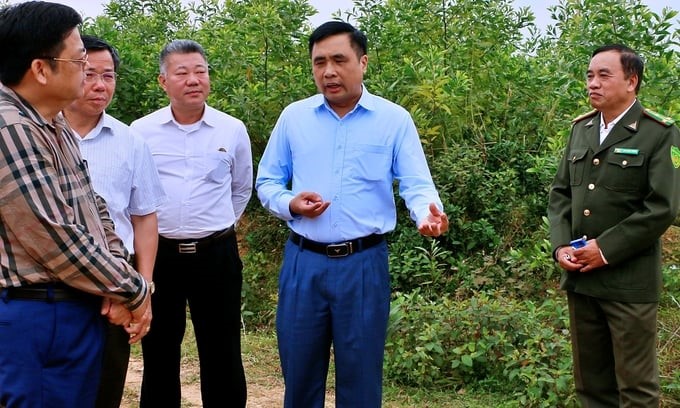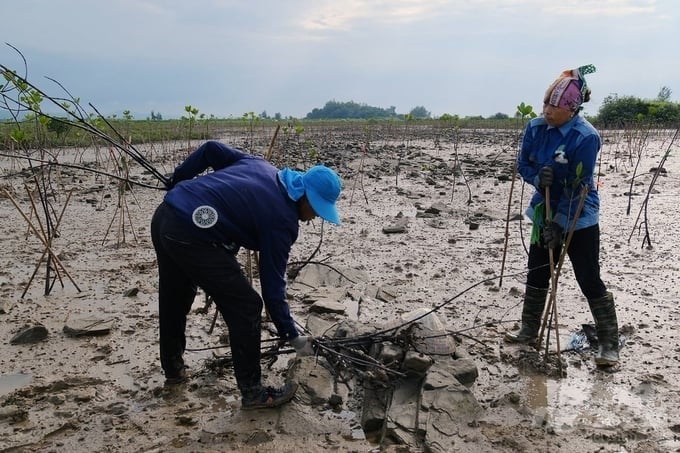May 16, 2025 | 10:11 GMT +7
May 16, 2025 | 10:11 GMT +7
Hotline: 0913.378.918
May 16, 2025 | 10:11 GMT +7
Hotline: 0913.378.918

Deputy Minister Nguyen Quoc Tri and the forestry sector's delegation inspected planted forests in Quang Tri province. Photo: Bao Thang.
In Official Dispatch 1108/LN-KH&HTQT sent to the Departments of Agriculture and Rural Development of provinces and cities dated July 26, the Department of Forestry informed that a number of localities have received requests from domestic and international organizations and individuals to learn about and propose the implementation of forest carbon sequestration and storage services, including measuring, reporting, appraising, issuing, and trading carbon credits.
However, this is a new field; the system of legal documents is not yet complete and detailed and needs to continue to be researched and perfected in the coming time.
Pursuant to the Government's Decree 06/2022/ND-CP regulating greenhouse gas emission mitigation, the agriculture and rural development sector is assigned to reduce 129.8 million tons of CO2 emissions. This is a common goal to increase the capacity of the nationally determined contribution (NDC), contributing to responding to global climate change.
Forestry is a field with great potential in helping countries, including Vietnam, fulfill their NDC commitment obligations. On that basis, the Ministry of Agriculture and Rural Development (MARD) has assigned the forestry and land use fields to reduce a minimum of 39.31 million tons of CO2 by 2025 and 79.1 million tons by 2030.
As of now, Vietnam is implementing only one program to transfer emission reduction results (forest carbon credits), which is the Emission Reductions Payment Agreement (ERPA) in the North Central Region signed on October 22, 2020, between MARD and the International Bank for Reconstruction and Development (World Bank).
According to ERPA, Vietnam transfers 10.3 million tons of CO2, with a maximum increase of 5 million tons of CO2, at a unit price of USD 5/ton. The total payment value is USD 51.5 million, of which 95% of the transfer amount will be included in Vietnam's NDC.
Besides, MARD and the Organization for Forest Financial Enhancement (Emergent), the administrative agency of the Lowering Emissions by Accelerating Forest Finance (LEAF) Coalition, are preparing to negotiate, sign, and implement ERPAs in the Central Highlands and South Central regions according to the Letter of Intent signed on October 31, 2021.
It is expected that Vietnam will transfer to LEAF/Emergent 5.15 million tons of CO2 from the Central Highlands and South Central regions in the 2021-2025 period. The entire amount of carbon credits is also included in Vietnam's NDC commitment.

Quang Ninh people plant mangrove forests. Photo: Bao Thang.
Mr. Tran Quang Bao, Director of the Department of Forestry, said that realizing the potential from forest carbon credits, some provinces such as Quang Nam, Son La, Lao Cai, and Thanh Hoa have proposed the development and implementation of a pilot project to invest and trade carbon credits. However, up to now, these provinces have not been able to implement it.
According to Mr. Bao, there are four main difficulties that provinces are facing when implementing forest carbon credits. First, it is the issue of lacking regulations and detailed instructions for implementation, including: forest carbon ownership, regulations on exchange and transfer of forest carbon, and management and use mechanisms of revenue from carbon credit services.
Second, emission reduction quotas that contribute to the implementation of NDC goals and the potential for tradable forest carbon credits of each locality have not been identified or allocated.
Third, information and awareness of many parties involved in forest carbon services are still limited, especially credit creation methods and credit calculation methods, as well as instructions on appraisal, verification, and issuance of credits.
In particular, forest carbon standards and credit measurement, reporting, appraisal, and issuance systems to apply to the domestic carbon market have not been developed. The carbon credit transfer projects that the forestry sector has built still depend on international organizations.
Currently, Ministries and branches are urgently building and perfecting the legal basis and institutional, technical, and capacity conditions to deploy the domestic carbon market and participate in the world market.
To prepare and be ready to deploy forest carbon services, the Department of Forestry emphasized that forest carbon sequestration and storage services are currently only being piloted in six North Central provinces, and there are no specific regulations or instructions for implementation and are continuing to be researched and perfected.
While waiting for detailed instructions, the Department recommends that localities proactively mobilize and integrate legal resources to implement measures to reduce emissions and increase absorption in managed forest areas to deploy the plan to reduce greenhouse gas emissions in the forestry sector according to Decision No. 1693/KH-BNN-KHCN dated April 28, 2023.
"The trade, exchange, and offset of forest carbon credits with domestic and international organizations and individuals must comply with the law and can only be carried out for the amount of residual emission reduction after fulfilling the responsibility to contribute NDC according to the allocated quota," said Director Tran Quang Bao.
Implementing Directive 13/CT-TTg dated May 2, 2024 of the Prime Minister, MARD is urgently implementing a program to assess the potential to reduce emissions and absorb forest carbon at national, regional, and local levels by 2030, with a vision to 2050.
On that basis, the Ministry will propose to allocate quotas to reduce emissions from forests to ecological regions and localities every year until 2030 to implement the NDC target.
Translated by Thu Huyen

(VAN) Cold-barn systems efficiently manage environmental and temperature conditions, which aids in the prevention of respiratory diseases in pigs and protects them from the vectors that transmit African swine fevers.

(VAN) To tackle challenges, the project 'Addressing key technical bottlenecks in the grouper supply chain in Vietnam' has been underway since 2024.

(VAN) The project 'Disease-Resilient and Sustainable Cassava Production Systems in the Mekong Region', funded by the Australian Center for International Agricultural Research (ACIAR), is being implemented from 2024 to 2028.

(VAN) Data from 10,000 farming households will help professionalize production organization and support the implementation of the One Million Hectares Program for High-Quality, Low-Emission Rice Cultivation.

(VAN) FAO Director-General QU Dongyu marks International Day of Plant Health at NENA conference.

(VAN) Deputy Minister of Agriculture and Environment Hoang Trung affirmed that floriculture and ornamental plants are a growing industry that receives significant global attention.

(VAN) The three staple crops dominating modern diets – corn, rice and wheat – are familiar to Americans. However, fourth place is held by a dark horse: cassava.